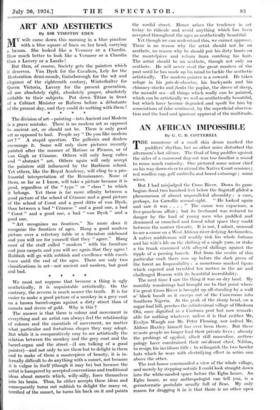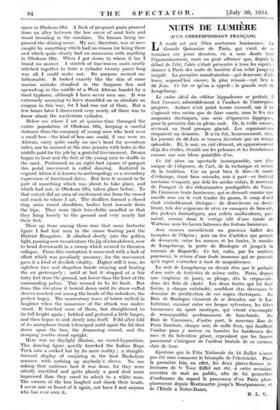AN AFRICAN IMPOSSIBLE
By G. C. B. COTTERELL
THE monotone of a small skin drum marked the paddlers' rhythm, but no other noise disturbed the afternoon's hot silence. The thud of long paddles against the sides of a camwood dug-out was too familiar a sound to rouse much curiosity. One pictured some minor chief on his way down-river to attend the Native Court sessions ; red woollen cap, golf umbrella and bored entourage ; some wives.
But I had misjudged the Cross River. Down its gam- bogian flood two hundred feet below the flagstaff glided a phenomenon of almost unparalleled absurdity ; a case, perhaps, for Canonic second-sight. " He looked again and saw it was . . . . " The canoe was capacious, a five-puncheon affair ; but its freeboard was reduced to danger by the load of young men who paddled and drummed or crouched and found what space they could between the narrow thwarts. It is not, I admit, unusual to see a canoe on a West African river defying Archimedes. A native middleman will readily risk his whole fortune and his wife's life on the shifting of a single yam, or stake a tin trunk crammed with alloyed shillings against the ripple of a passing launch. But from the centre of this particular craft there rose up before the dark green of the forest an Impossibility : a monstrous masked figure which capered and trembled ten metres in the air and challenged Reason with its beautiful incredibility.
The next time I saw the thing it was on dry land. My monthly wanderings had brought me to that point where ne great Cross River is brought up all-standing by a wall (31' black basalt as it sweeps out of the Cameroons into Southern Nigeria. At the peak of the sharp bend, on a sugar-loaf hill, perches the infinitesimal village of Obokum Obi, once dignified as a Customs post but now remark- able for nothing whatever, unless it is that neither Mr. Evelyn Waugh nor Mr. Peter Fleming, nor indeed Mr. Aldous Huxley himself has ever been there. But these remote people no longer lead their private lives ; already the probings of applied, albeit still masculine, anthro- pology have constrained their soi-disant chief, Ndifon, to resign his invidious title ; to relinquish the two bowler hats which he wore with electrifying effect in series one above the other.
The rest-house commanded a view of the whole village, and merely by stepping outside I could look straight down into the white-sanded space before the Egbo house. An Egbo house, as any anthropologist can tell you, is a gerontocratic postulate usually full of fleas. My only reason for dragging it in is that there is no other open space in Obokum Obi. A flock of pregnant goats pranced from an alley between the low eaves of mud huts and stood brooding in the sunshine. No human being im- proved the shining scene. My eye, therefore, was at once caught by something which had no reason for being there and which quite clearly had no connexion with anything in Obokum Obi. When I got down to where it lay I found no answer. A stretch of fine-woven mats neatly 'stitched together to form a cylinder twenty paces long was all I could make out. Its purpose seemed un- fathomable. It looked exactly like the skin of some marine mistake sloughed in the Sargasso Sea and .spewed-up in the middle of a West African hamlet by a tired typhoon, although I have never seen one. It was • extremely annoying to have stumbled on so absolute an enigma in this way, for I had run out of films. But a few hours later I discovered very nearly all there was to know about the mysterious cylinder.
Below me where I sat at quinine-time thronged the entire population of Obokum Obi, keeping a careful distance from the company of young men who bent over a small box—the kind of box one could, if one were an African, carry quite easily on one's head for seventeen miles, nor be amused at the nine pennies with holes in the middle paid for the job by a grateful Government. Drums began to beat and the feet of the young men to shuffle in the sand. Performed on an eight-foot square of parquet this pedal movement is called dancing. Imitated in negroid Africa it is known to anthropology as a secondary expreSsion of functional drive. But here it seemed to be part of something which was about to take place, and which had not, in Obokum Obi, taken place before. To that extent did an aura of excitement rise from the crowd and reach to where I sat. The shuffiers formed a closed ring, arms round shoulders, bodies bent inwards from the hips. They wore their loin-cloths unrolled so that they hung loosely to the ground and very nearly hid their feet.
Then up from among them rose that same fantastic figure I had last seen in the canoe floating past the District Bungalow. It climbed slowly into the golden light, pausing now to caricature the jig of a breakdown, now to bend downwards in a swoop which seemed to threaten collapse. From this contortion it recovered with a lack of effort which was peculiarly uncanny, for the movement gave it a kind of devilish vitality. Higher still it rose, its sightless face and shapeless hands swaying and beating the air grotesquely ; until at last it stopped at a fair forty feet from the ground, not lower than the least of the surrounding palms. This seemed to be its limit. But from this elevation it bowed down until its straw-cuffed sleeves reached out among the heads of the onlookers, the perfect bogey. The momentary wave of terror melted in laughter when the innocence of the attack was under- stood. It touched none of them, but straightened to its full height again ; bobbed and gestured a little longer, • and then began to sink slowly into itself. Fold after fold of its amorphous trunk telescoped until again the lid shut down upon the box, the drumming ceased, and the stooping youths stood upright.
Here was no daylight illusion, no crowd-hypnotism. This dancing figure quietly knocked the . Indian Rope Trick into a cocked hat by its mere reality ; a straight- forward display of conjuring in the best Maskelyne manner, with nothing up anybody's sleeve. No use 'asking that audience how it was done, for they were utterly mystified and quite plainly a good deal more impressed than they cared to admit to a white man. The owners of the box laughed and shook their heads. I never saw or heard of it again, nor have I met anyone who has ever seen it.















































 Previous page
Previous page